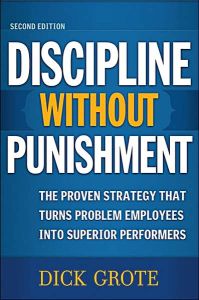Join getAbstract to access the summary!

Join getAbstract to access the summary!
Dick Grote
Discipline Without Punishment
The Proven Strategy That Turns Problem Employees into Superior Performers
AMACOM, 2006
What's inside?
Your employees aren’t delinquents, so drop that antiquated, fear-based disciplinary system – but still get what you want.
Recommendation
For CEOs, human-resource staff members and anyone who influences the development of an organization’s disciplinary system, this book is a must-read. Managers, supervisors and small-business owners also will benefit from Dick Grote’s guidance on implementing a nonpunitive approach to improved performance. getAbstract appreciates the thoughtfulness and detail of his suggested disciplinary system, as well as his advice on incorporating this system into your daily management practices.
Summary
About the Author
Dick Grote, HR expert and consultant, taught management at the University of Dallas Graduate School for 20 years. He also wrote Forced Ranking, The Performance Appraisal Question and Answer Book and The Complete Guide to Performance Appraisal, as well as numerous articles.
















Comment on this summary